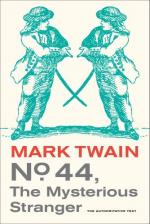But he couldn’t make head or tail of the situation. There must be an enchanter somewhere on the premises, but who was it? Marget was not seen to do any jugglery, nor was Ursula, nor yet Gottfried; and still the wines and dainties never ran short, and a guest could not call for a thing and not get it. To produce these effects was usual enough with witches and enchanters—that part of it was not new; but to do it without any incantations, or even any rumblings or earthquakes or lightnings or apparitions—that was new, novel, wholly irregular. There was nothing in the books like this. Enchanted things were always unreal. Gold turned to dirt in an unenchanted atmosphere, food withered away and vanished. But this test failed in the present case. The spies brought samples: Father Adolf prayed over them, exorcised them, but it did no good; they remained sound and real, they yielded to natural decay only, and took the usual time to do it.
Father Adolf was not merely puzzled, he was also exasperated; for these evidences very nearly convinced him—privately—that there was no witchcraft in the matter. It did not wholly convince him, for this could be a new kind of witchcraft. There was a way to find out as to this: if this prodigal abundance of provender was not brought in from the outside, but produced on the premises, there was witchcraft, sure.
Chapter 7
Marget announced a party, and invited forty people; the date for it was seven days away. This was a fine opportunity. Marget’s house stood by itself, and it could be easily watched. All the week it was watched night and day. Marget’s household went out and in as usual, but they carried nothing in their hands, and neither they nor others brought anything to the house. This was ascertained. Evidently rations for forty people were not being fetched. If they were furnished any sustenance it would have to be made on the premises. It was true that Marget went out with a basket every evening, but the spies ascertained that she always brought it back empty.




